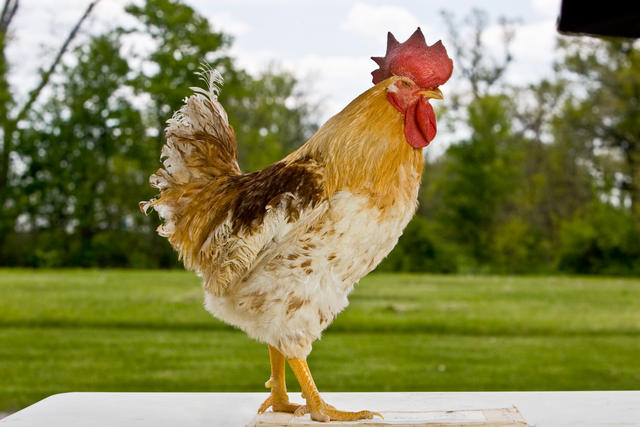UK specialists urge vigilance to protect poultry from bird flu
UK specialists urge vigilance to protect poultry from bird flu


Two years ago, the worst outbreak of bird flu to hit the United States wiped out more than 48 million birds. But it also taught poultry producers how to fight back against future outbreaks.
Recently H7, highly pathogenic strain of avian influenza, or HPAI, appeared on a large poultry farm in Tennessee by way of migratory ducks and geese. Currently no birds in Kentucky are infected, however University of Kentucky College of Agriculture, Food and Environment specialists are urging all poultry producers to take precautions and to stay aware.
The H7 virus is a North American strain that is of wild lineage, meaning waterfowl could be a source of it. Since this is the season for waterfowl to migrate north in the Mississippi flyway, there will be increased presence of migratory ducks and geese in Kentucky.
“Poultry producers and small flock owners need to be aware of waterfowl in their area,” said Tony Pescatore, UK poultry specialist. “You should avoid these migratory birds and their droppings. Lakes, farm ponds, wooded areas, golf courses and parks are all areas that should be of concern. Always wear clean footwear and clothing when taking care of poultry after being in these types of environments.”
The strain in Tennessee is highly contagious to poultry but is not to humans or pets.
Avian influenza, also known as bird flu, is a group of viruses that infects domestic and wild birds. The viruses are classified by their ability to cause illness and death into either low pathogenic or highly pathogenic. The current outbreak is only the third such highly pathogenic occurrence in roughly 30 years. While the thousands of sick birds may sound surprising, they represent only a very small percentage of the total poultry population in the United States.
“We have a lot of poultry growers in Kentucky with very large flocks, quite a few with small flocks and backyard flock owners who are concerned as well,” Pescatore said.
He urged all growers to follow FLU biosecurity and prevention guidelines.
F—Flock observation—Early detection is important to stop the spread of disease. Growers need to observe flocks daily and note changes in appearance, behavior, and drinking and eating habits.
L—Limit traffic—Contaminated clothing and equipment can spread avian influenza between poultry premises. Keep a log of visitors and vehicles on the farm. Be aware of places visitors may have had contact with birds or their droppings such as hunting lands, ponds, pet stores, zoos and parks. Visitors can accidently bring disease to the farm.
“At minimum, it’s a good idea to have visitors and workers put on clean boots to help stop disease from spreading,” Pescatore said. “I can’t stress how important cleanliness is where is concerned.”
U—Unwanted critters—avian influenza can be spread through the feces and bodily fluids of infected birds, so keep poultry from coming into contact with wild birds. Pescatore said it’s a good idea to keep areas mowed around poultry houses and coops to control wild birds and rodents. Keep all other animals out of the chicken house. Growers should isolate new or returning birds from the rest of the flock for at least 30 days.
Signs of avian influenza include sudden death; little to no appetite or energy; little to no egg production; soft or deformed eggs; nasal discharge; coughing, sneezing or breathing difficulty; swelling around the head, neck and eyes; purple discoloration; loss of muscle control; drooping wings; twisting of the head and neck; inability to move and diarrhea. Birds may have the disease for three to seven days before they show signs, and death can occur between 24 and 48 hours after the first sign.
“It’s important to note that many of the symptoms can also be related to other more common poultry ailments,” Pescatore said. “Unfortunately with HPAI, infected birds don’t survive. If you observe unusual symptoms or a large number of deaths in your flock, you need to contact your local veterinarian or the UK VDL.”
The UK Veterinary Diagnostic Lab will test birds for a fee. The UK VDL and the Murray State University Breathitt Veterinary Lab are both certified through the National Animal Health Laboratory Network to handle HPAI cases.
